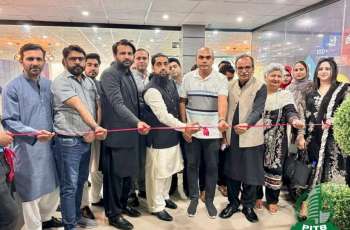GENOA (Pakistan Point News / Sputnik - 15th May, 2020) ENOA, Italy, May 15 (Sputnik), Anastasia Levchenko - Robots that will look like humans and not require special programming skills from users are bound to enter our lives in the post-coronavirus era and ensure a physical presence in remote work, thus protecting humans from such risks as infection or pollution, Antonio Bicchi, president of the Italian Institute of Robotics and Intelligent Machines (I-RIM), has told Sputnik in an interview.
"We are definitely going in a direction where the concept of remote working has to be brought to the physical level. What concerns our software programs, our office automation, and when it comes to physical work, work that you do in a factory, work that you do in a hospital - all of these jobs require physical action. There robotics will allow to keep producing goods and giving services without exposing the society to the risks of epidemy," Bicchi, who is also a professor at the University of Pisa and a senior researcher at the Italian Institute of Technology, based in Genoa, said.
Italy is among the countries that have been hit hardest by the coronavirus. The wave of infection in Italy has already ebbed, and since May 4, the country has entered the so-called Phase Two of the emergency, or a gradual return to normal life.
"I believe in the next phase we may see many robots used not completely autonomously, but in a symbiosis with a human operator that will be using robot as a projection of his own body. So they will be able to do 'smart working' (remote working) by doing a physical work, with physical presence," Bicchi said.
The researcher expressed a strong conviction that the technology for this already exists, but the transition to such an automatized life has not yet happened because there has not been enough motivation and economic push for it in society. However, the demand is stronger than ever before.
The main obstacle on the path to having intelligent machines available for widespread, everyday use in life is the need for them to be coded by users with a programming language.
"Robots are still too difficult to program. Normal people cannot afford programming a robot if you're not a programmer, for traditional robots. Even if those robots have autonomy, still you need the ability to write programs. How many people can program with C++ language or Python language? A few can but not so many. So that is a limitation that we have. And I think that the real turning point is that we now realize that normal people, people who have other skills can use robots," Bicchi said.
He provided an example of nurses who would benefit from being able to use robots in their work but did not really need to study programming.
"They have their specialty, they have their profession and it is very valuable, and they need to use robots without learning robotics. That is what is going to change a lot. We are working on interfaces that will make it possible to use robots without codes to program them, but by simply showing them what they have to do. This is the concept of avatars that we are exploring. I think we have the technology," he continued.
According to the scientist, the concept of a "physical smart working" or "physical remote working" will be applicable not only for cases in which there is a risk of virus infection but also for avoiding pollution risks, or simply for saving time and money.
� "I think this is a huge opportunity for the society in Italy in particular but also all over Europe and worldwide. This opportunity comes from the fact that we have to learn to work in a safer way, to be kept away from risks, which today is contagion, but it can also be simply pollution, or it can be also that you simply save time by avoiding to travel, to commute if you can also do this from home," Bicchi said.
He added that since physical smart working would be very beneficial for society, the elements that are already there in the technology domain should be put together to make it happen.
"It will enable a real change, comparable to what has happened with the transition from personal computers of fifteen years ago to smart phones that everybody has now," he added.
The main areas in which intelligent machines are going to take grip in the post-coronavirus era are machine manufacturing and maintenance; waste disposal and especially this refers to dangerous waste, such as nuclear; agriculture; and healthcare and medicine, where the use of telerobots and telepresence will be amplified even further.



